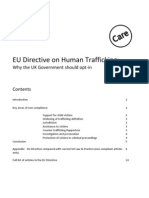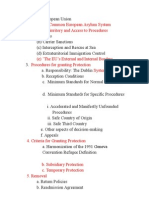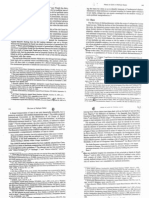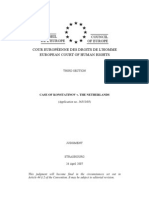Grusa Matevzic - Compliance
Grusa Matevzic - Compliance
Uploaded by
api-3705656Copyright:
Available Formats
Grusa Matevzic - Compliance
Grusa Matevzic - Compliance
Uploaded by
api-3705656Copyright
Available Formats
Share this document
Did you find this document useful?
Is this content inappropriate?
Copyright:
Available Formats
Grusa Matevzic - Compliance
Grusa Matevzic - Compliance
Uploaded by
api-3705656Copyright:
Available Formats
Working title of paper proposal:
Compliance of EU Member States with International Refugee and Human Rights
law after the implementation of exclusion clauses of Qualification Directive
Current global threats to the national security, such as terrorism, have a strong impact on
the asylum policy of EU Member States. It seems that expulsion clauses contained in the
Article 1(F) of Refugee Convention are no longer a sufficient safeguard against terrorism.
EU adopted a Qualification Directive that expands the 1(F) expulsion clauses. Articles
14(4) – (5) of the Qualification Directive allow Member States to revoke, end or refuse to
renew refugee status where there are reasonable grounds for regarding a refugee as a
danger to the security. Under the Refugee Convention that kind of danger is a reason for
the exception to the principle of non-refoulement that applies to the refugees and not as
an exclusion clause, applied to the persons before even being recognized as refugees. But
paragraph 5 of Article 14 of the Qualification Directive states that in such situations,
Member States may decide not to grant a refugee status and by that they expand the
Refugee Convention’s exclusion clauses.
With the focus on the exclusion and non-refoulment clauses of Qualification Directive, I
will try to explore the protection offered to the asylum seeker suspected of being engaged
in terrorism. Do the standards still comply with the International Refugee and Human
Rights law? Is the principle of non-refoulement as understood under the Refugee
Convention and as extended in the prohibition of expulsion to torture or inhuman and
degrading treatment or punishment under the Article 3 of the European Convention of
Human Rights endangered by the recent practice of EU Member States?
I will look at the legislation and jurisprudence of UK and Germany, before and after the
implementation of Qualification Directive. Although the directives do not preclude
Member States from keeping the higher standards of protection, there seems to be a
tendency to lower the existent standards while implementing the directives. Is it really
necessary that in order to attain the result demanded by the directive, the Member States
must adopt the provisions that are not in accordance with Refugee Convention and
International Human Rights law?
I will try to examine how Member States handle the obligation to respect International
Refugee and Human Rights law while implementing the EU asylum legislation and what
prevails in the conflict between them.
You might also like
- 5+Affidavit+of+Truth Affidavit+of+Status+ TemplateDocument5 pages5+Affidavit+of+Truth Affidavit+of+Status+ TemplateBILLY SHARES80% (5)
- Role of DR B R Ambedkar in Modern India-58335516Document6 pagesRole of DR B R Ambedkar in Modern India-58335516admNo ratings yet
- Reinventing Government in The PhilippinesDocument8 pagesReinventing Government in The Philippinesrio0% (1)
- CYELP Vol 8 5Document36 pagesCYELP Vol 8 5Tina HorvatNo ratings yet
- The Evolving Face of European Criminal Justice in An Ever-Changing WorldDocument8 pagesThe Evolving Face of European Criminal Justice in An Ever-Changing WorldAlaa RashedNo ratings yet
- The EU System of Temporary Protection - The Case of UkraineDocument5 pagesThe EU System of Temporary Protection - The Case of UkraineGiannis LagourosNo ratings yet
- Final Exam: European Economic & Governance IssuesDocument8 pagesFinal Exam: European Economic & Governance IssuesNina FedorovaNo ratings yet
- Common European Asylum SystemDocument13 pagesCommon European Asylum SystemwighmalandcompanyNo ratings yet
- Marson and Ferris - Collective Redress in The EU - FINALDocument25 pagesMarson and Ferris - Collective Redress in The EU - FINALAamir Shahzad JhammatNo ratings yet
- EU CompetencesDocument20 pagesEU CompetencesLeo IglesiasNo ratings yet
- New Issues in Refugee ResearchDocument32 pagesNew Issues in Refugee ResearchB. Valentina JiménezNo ratings yet
- EPRS_BRI(2024)767148_ENDocument8 pagesEPRS_BRI(2024)767148_ENLuciaNo ratings yet
- Fund - Rights - Strategy - Endorsed by MB - 31 - 3 - 2011Document8 pagesFund - Rights - Strategy - Endorsed by MB - 31 - 3 - 2011IacobDorinaNo ratings yet
- Revision of Directive 2011/36/EU On Preventing and Combating Trafficking in Human Beings and Protecting Its VictimsDocument12 pagesRevision of Directive 2011/36/EU On Preventing and Combating Trafficking in Human Beings and Protecting Its VictimsMaria RuizNo ratings yet
- Mila ISAKOVSKA THE FLAWED EU ASYLUM SYSTEM - HUMAN RIGHTS TRUMPS POLICYDocument15 pagesMila ISAKOVSKA THE FLAWED EU ASYLUM SYSTEM - HUMAN RIGHTS TRUMPS POLICYCentre for Regional Policy Research and Cooperation StudiorumNo ratings yet
- The EU system of temporary protection under Directive 2001Document5 pagesThe EU system of temporary protection under Directive 2001johnlag21No ratings yet
- Celex 32011L0095 en TXTDocument18 pagesCelex 32011L0095 en TXTAnonymous FZq0OlNo ratings yet
- Decision of The European Ombudsman On TraineeshipsDocument7 pagesDecision of The European Ombudsman On TraineeshipsGabriela Adriana CotabitaNo ratings yet
- European Jurisprudence On The Protection of Crime VictimsDocument14 pagesEuropean Jurisprudence On The Protection of Crime VictimsFelixDelux2023roNo ratings yet
- Development of EU policy on Immigration and Asylum_0Document17 pagesDevelopment of EU policy on Immigration and Asylum_0Trà My NguyễnNo ratings yet
- CFSP After The Lisbon TreatyDocument22 pagesCFSP After The Lisbon TreatyjerictionlocNo ratings yet
- EN EN: European CommissionDocument21 pagesEN EN: European CommissionAlexa JoNo ratings yet
- Position Paper Future Common European Asylum SystemDocument9 pagesPosition Paper Future Common European Asylum SystemRickard OlsekeNo ratings yet
- Dublin IIIDocument29 pagesDublin IIIpouxfNo ratings yet
- Operational Plan Com 166 16Document10 pagesOperational Plan Com 166 16Bogdan EnacheNo ratings yet
- Principles of EU LawDocument15 pagesPrinciples of EU LawAndreea Cristina DiaconuNo ratings yet
- Fundamental Rights StrategyDocument19 pagesFundamental Rights StrategyLetiția TimişNo ratings yet
- ssrn-3735345Document60 pagesssrn-3735345Devansh Singh shekhawatNo ratings yet
- Second PIF Report, Sept 2022, COM - 2022 - 466Document15 pagesSecond PIF Report, Sept 2022, COM - 2022 - 466sargetiaNo ratings yet
- 14797conceptual Framework ESDPDocument11 pages14797conceptual Framework ESDPBernadett KiserNo ratings yet
- EU Coutering Hybrid ThreatsDocument18 pagesEU Coutering Hybrid ThreatsIulia RoșuNo ratings yet
- Eu Law Dissertation TitlesDocument5 pagesEu Law Dissertation TitlesCustomWrittenCollegePapersAtlanta100% (1)
- EN EN: European CommissionDocument19 pagesEN EN: European Commissionrobnet-1No ratings yet
- Compendium of case law of the European Court of Human Rights on the death penalty and extrajudicial executionFrom EverandCompendium of case law of the European Court of Human Rights on the death penalty and extrajudicial executionNo ratings yet
- TOWARDS IBM OF THE EXT BORDERS - COM 2002 - 233 FinalDocument26 pagesTOWARDS IBM OF THE EXT BORDERS - COM 2002 - 233 FinalIraIrochkaNo ratings yet
- Rights of Dental Patients EUDocument8 pagesRights of Dental Patients EUFuckernanNo ratings yet
- EU Consular Protection Directive Implementation ReportDocument23 pagesEU Consular Protection Directive Implementation ReportPaulo RamosNo ratings yet
- COM (2011) 573 Final en Towards An EU Criminal PolicyDocument12 pagesCOM (2011) 573 Final en Towards An EU Criminal PolicyAndré RebentischNo ratings yet
- Fact Sheet Article 3 ECHR. UNHCR Manual On Refugee Protection and The ECHR.Document52 pagesFact Sheet Article 3 ECHR. UNHCR Manual On Refugee Protection and The ECHR.Sara Taira HuierNo ratings yet
- Data Retention Challenge Press ReleaseDocument3 pagesData Retention Challenge Press ReleaseTJ McIntyreNo ratings yet
- EU Directive On Human Trafficking Why The UK Should Opt in 7 Feb 2011Document16 pagesEU Directive On Human Trafficking Why The UK Should Opt in 7 Feb 2011Asad Ali KhanNo ratings yet
- CIPP E DemoDocument6 pagesCIPP E DemoTaweewat BurimsittichaiNo ratings yet
- Eprs Bri (2023) 747432 enDocument11 pagesEprs Bri (2023) 747432 enGustavo MarinNo ratings yet
- Kashtaarjitham 5.0 + Charan's Kaamajitham 1.0 + Krishna's Leela - EUDocument40 pagesKashtaarjitham 5.0 + Charan's Kaamajitham 1.0 + Krishna's Leela - EUshirurh7No ratings yet
- White Paper On The EU Directive 2016 800Document38 pagesWhite Paper On The EU Directive 2016 800Francisco EstradaNo ratings yet
- Europol Recruitment GuidelinesDocument15 pagesEuropol Recruitment GuidelinesStelios KaragiannisNo ratings yet
- MAIANI VEVSTAD Critical Assessment of AcquisDocument11 pagesMAIANI VEVSTAD Critical Assessment of AcquistitobattagliaNo ratings yet
- EU Criminal Law Relocated: Recent DevelopmentsDocument24 pagesEU Criminal Law Relocated: Recent DevelopmentsDeividasBerNo ratings yet
- Master Thesis Eu LawDocument8 pagesMaster Thesis Eu Lawjoannapaulsenelgin100% (1)
- Guidelines: Human Rights and International Humanitarian LawDocument87 pagesGuidelines: Human Rights and International Humanitarian LawManuel Sánchez MorenoNo ratings yet
- Module 3 - General Principles of ICL PDFDocument19 pagesModule 3 - General Principles of ICL PDFTammy YahNo ratings yet
- Eu Security Rules EUCI PDFDocument49 pagesEu Security Rules EUCI PDFkreol-sNo ratings yet
- The Reform of FrontexDocument5 pagesThe Reform of Frontexanon_560773646No ratings yet
- Eu Law Thesis IdeasDocument7 pagesEu Law Thesis IdeasCarmen Pell100% (2)
- Oudejans Et Al. Protecting The EU External BordersDocument25 pagesOudejans Et Al. Protecting The EU External BordersJulián ÁlvarezNo ratings yet
- RP175 PDFDocument99 pagesRP175 PDFRita FigueiraNo ratings yet
- EU Criminal LawDocument1 pageEU Criminal Lawquin.nijdam2No ratings yet
- 2014 Charter Factsheet enDocument3 pages2014 Charter Factsheet enANDREASNo ratings yet
- Opinion On The Legal Basis For The Initiative of EP - Council - Directive of The European Ptotection OrderDocument8 pagesOpinion On The Legal Basis For The Initiative of EP - Council - Directive of The European Ptotection OrderAnonymous FZq0OlNo ratings yet
- Final Paper - Protection of Fundamental Rights in The European UnionDocument8 pagesFinal Paper - Protection of Fundamental Rights in The European UnionTâniaPaivaNo ratings yet
- EU General Data Protection Regulation (GDPR) - An Implementation and Compliance GuideFrom EverandEU General Data Protection Regulation (GDPR) - An Implementation and Compliance GuideNo ratings yet
- Human rights and criminal procedure: The case law of the European Court of Human RightsFrom EverandHuman rights and criminal procedure: The case law of the European Court of Human RightsNo ratings yet
- Language Flyer1Document3 pagesLanguage Flyer1api-3705656No ratings yet
- Brussels Conference Final AgendaDocument2 pagesBrussels Conference Final Agendaapi-3705656No ratings yet
- ACNUR 2006 Global TrendsDocument105 pagesACNUR 2006 Global Trendsapi-3705656No ratings yet
- Language FlyerDocument1 pageLanguage Flyerapi-3705656No ratings yet
- Section I: Table of Contents For 5 Edition RevisionDocument2 pagesSection I: Table of Contents For 5 Edition Revisionapi-3705656No ratings yet
- EU Section - Table of ContentDocument2 pagesEU Section - Table of Contentapi-3705656No ratings yet
- Budapest EB Meeting Agenda - Final1Document2 pagesBudapest EB Meeting Agenda - Final1api-3705656No ratings yet
- Brussels Conference AgendaDocument2 pagesBrussels Conference Agendaapi-3705656No ratings yet
- Orientation SheetDocument3 pagesOrientation Sheetapi-3705656No ratings yet
- James Hathaway, "The Law of Refugee Status", PDocument23 pagesJames Hathaway, "The Law of Refugee Status", Papi-3705656No ratings yet
- Ayegh v. SwedenDocument19 pagesAyegh v. Swedenapi-3705656No ratings yet
- Nagalingam V Canada (Citizenship and Immigration)Document35 pagesNagalingam V Canada (Citizenship and Immigration)api-3705656No ratings yet
- Konstatinov v. The NetherlandsDocument15 pagesKonstatinov v. The Netherlandsapi-3705656No ratings yet
- CASE OF GARABAYEV v. RUSSIADocument26 pagesCASE OF GARABAYEV v. RUSSIAapi-3705656No ratings yet
- Perlindungan Hukum Terhadap Anak Dalam Perspektif Hak Asasi ManusiaDocument12 pagesPerlindungan Hukum Terhadap Anak Dalam Perspektif Hak Asasi ManusiaPetronella Charlota SuitelaNo ratings yet
- Policy Science PerspectiveDocument50 pagesPolicy Science PerspectiveLeiya LansangNo ratings yet
- Pediatric Health Nursing Unit I BSN Year III, Semester V: by Hidayatullah Khan BSN, DPN & MSN Kmu-InsDocument59 pagesPediatric Health Nursing Unit I BSN Year III, Semester V: by Hidayatullah Khan BSN, DPN & MSN Kmu-InsSHAFIQNo ratings yet
- Topic 1: Rawl's Justice As Fairness PrincipleDocument4 pagesTopic 1: Rawl's Justice As Fairness PrincipleHarold GarciaNo ratings yet
- Essays: No Community, No Democracy, Part IIDocument11 pagesEssays: No Community, No Democracy, Part IIزهرة الزنبق زهرة الزنبقNo ratings yet
- Liberal View of StateDocument33 pagesLiberal View of Statedaanunair2013No ratings yet
- Review of LiteratureDocument13 pagesReview of LiteratureAbhishek SaravananNo ratings yet
- Álvaro Pérez Ragone - General ReportDocument228 pagesÁlvaro Pérez Ragone - General ReportbuzzNo ratings yet
- Human Rights Make Man HumanDocument20 pagesHuman Rights Make Man HumanJamiah Obillo HulipasNo ratings yet
- The Concept of Rights - An OverviewDocument13 pagesThe Concept of Rights - An OverviewSejal RaghuwanshiNo ratings yet
- Model Answers PSIR Test 1Document28 pagesModel Answers PSIR Test 1Shruti MehrotraNo ratings yet
- ABINASH DAS - Assignment 2Document9 pagesABINASH DAS - Assignment 2abinash dasNo ratings yet
- Discrimination Towards IPDocument2 pagesDiscrimination Towards IPShania SarciaNo ratings yet
- Human Rights - Law LLB NotesDocument111 pagesHuman Rights - Law LLB NotesSuraj SrivatsavNo ratings yet
- Citizenship Report 2019 Full Updated PDFDocument193 pagesCitizenship Report 2019 Full Updated PDFtholunNo ratings yet
- Liberties Rule of Law Report 2024 FULLDocument621 pagesLiberties Rule of Law Report 2024 FULLWebsite DocumentoNo ratings yet
- 2024 Course Outline IHRL 9 Sept 2024Document10 pages2024 Course Outline IHRL 9 Sept 2024mutugicollins079No ratings yet
- The EnlightenmentDocument58 pagesThe EnlightenmentJohn Dau MakuachNo ratings yet
- Teachers Guide in Facilitating GMRC and Values EducationDocument4 pagesTeachers Guide in Facilitating GMRC and Values EducationShiela Mae GaaNo ratings yet
- Accomplishments On Anti-Trafficking in Persons: LCAT Form 2018-01Document1 pageAccomplishments On Anti-Trafficking in Persons: LCAT Form 2018-01Warlito Sarenas 11No ratings yet
- Executive Order No. 03 Series of 2017 (Re-Organizing The Human Rights Action Center (Hrac) and Creation of Human Rights Action Team (Hract) of The Municipality of Bamban, Province of Tarlac)Document2 pagesExecutive Order No. 03 Series of 2017 (Re-Organizing The Human Rights Action Center (Hrac) and Creation of Human Rights Action Team (Hract) of The Municipality of Bamban, Province of Tarlac)San Florentino San Rafael100% (1)
- Bill of RightsDocument30 pagesBill of RightsReina100% (1)
- PARAMITA - CHAKRABORTYAristotle On The state2021-06-10PARAMITA - CHAKRABORTYAristotle On The State2020-05-03Aristotle On The StateDocument4 pagesPARAMITA - CHAKRABORTYAristotle On The state2021-06-10PARAMITA - CHAKRABORTYAristotle On The State2020-05-03Aristotle On The StateYasir HamidNo ratings yet
- LESSON 1 - Life Skills Children's RightsDocument6 pagesLESSON 1 - Life Skills Children's RightsbotleNo ratings yet
- DD Basu Commentary On The Constitution of In2018-08!21!06-30Document67 pagesDD Basu Commentary On The Constitution of In2018-08!21!06-30Aditya SinghNo ratings yet
- Ge8074 HR Lesson PlanDocument2 pagesGe8074 HR Lesson PlanprakashpacetNo ratings yet
- The Role of A Citizen in Upholding Sovereignty, UnityDocument2 pagesThe Role of A Citizen in Upholding Sovereignty, Unityaditya .dNo ratings yet







































































































